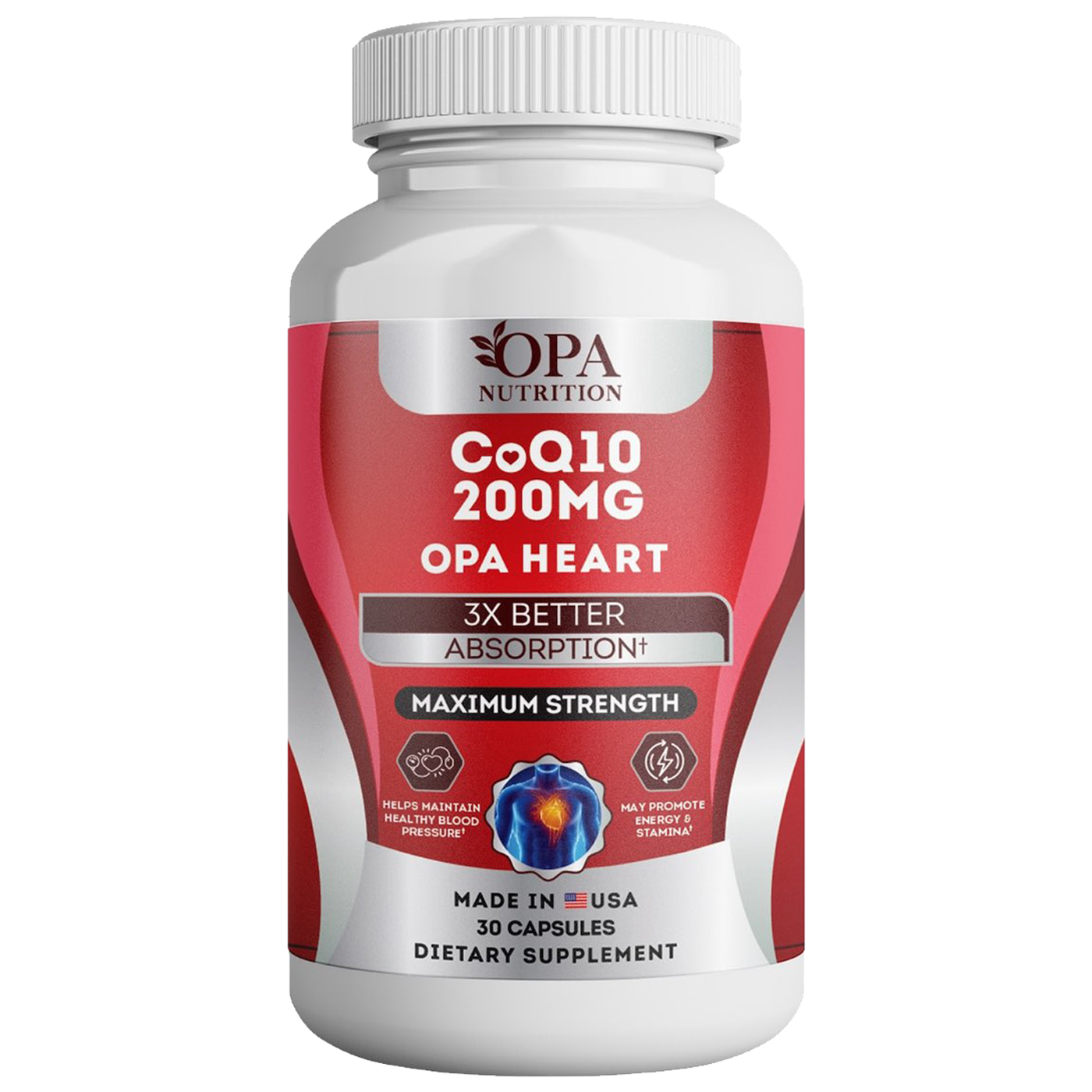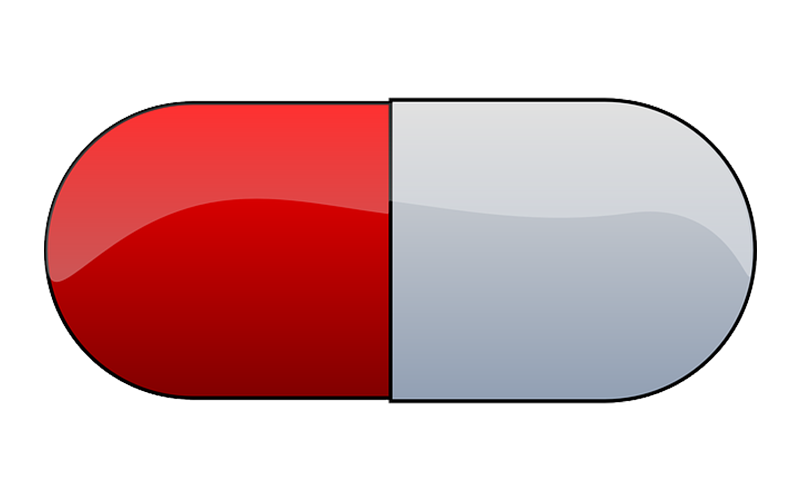Are you looking for a natural way to boost your energy levels and fatigue, improve heart health, and protect against age-related diseases? Coenzyme Q10, or CoQ10, has been gaining popularity due to its incredible range of potential health benefits. In this blog post, we'll explore the role of CoQ10 in the human body, factors that affect its levels, and potential side effects and interactions. Additionally, we'll discuss what is the recommended dosage for CoQ10 for various conditions. Let's dive in and discover the power of CoQ10!
Short Summary
- CoQ10 is a naturally occurring antioxidant that helps with energy production and neutralizing free radicals.
- Aging, statin medications, and other factors can affect CoQ10 levels in the body. Supplementation may help counteract this decline for various conditions.
- It is important to be aware of potential side effects and interactions when taking CoQ10 supplements to ensure a safe experience.

OPA Heart
The #1 CoQ10 for Heart Health
Understanding CoQ10 and Its Importance

Coenzyme Q10, also known as CoQ10, is a naturally occurring antioxidant found in human cells, responsible for essential functions such as energy production and neutralizing harmful free radicals. CoQ10 is predominantly found in the mitochondria, where it is converted from ubiquinone to ubiquinol, a form readily absorbed and employed by the body for energy production.
Although our bodies produce CoQ10, its levels can be increased through dietary sources such as organ meats, fish, and whole grains, as well as dietary supplements. Numerous clinical trials have explored the potential health benefits of CoQ10 supplementation, including its role in heart disease prevention, energy production, and athletic performance enhancement.
The Conversion Process
CoQ10 is initially absorbed in the small intestines in the form of ubiquinone before being converted back to ubiquinol in the lymph. This conversion process is vital for the proper functioning of CoQ10 in the body.
A 2018 randomized trial demonstrated that taking 200mg daily doses of ubiquinol supplements led to a 1.5-fold increase in blood CoQ10 levels, while supplements containing ubiquinone did not have a significant impact on CoQ10 levels. This suggests that ubiquinol is more readily absorbed and utilized by the body than ubiquinone.
Therefore, when selecting CoQ10 supplements, it is essential to consider the type of CoQ10 and its absorption rate to ensure optimal results.
The Antioxidant Role
CoQ10's antioxidant properties play a crucial role in protecting our cells from damage caused by unstable molecules called free radicals. In addition to neutralizing these harmful substances, CoQ10 has been shown to reduce inflammation, leading to overall well-being and potentially reducing the risk of age-related diseases.
A study focused on the effects of CoQ10 supplementation on left ventricular function in patients with heart disease found that CoQ10 supplementation helped reduce oxidative stress, further demonstrating its antioxidant capabilities. By incorporating CoQ10 supplements into your daily routine, you may experience improved cellular health and protection against oxidative damage.
Factors Affecting CoQ10 Levels

While the human body naturally produces CoQ10, certain factors can affect its levels, such as aging and the use of statin medications. As we age, our body's production of CoQ10 diminishes, potentially leading to health complications.
Statin medications, commonly prescribed for reducing cholesterol levels, can also decrease CoQ10 levels in blood and muscle tissues, resulting in muscle pain
Aging and CoQ10
Research suggests that CoQ10 levels decrease as we age, although the exact relationship between reduced CoQ10 levels and aging remains unclear. This decline in CoQ10 production may contribute to an increased risk of age-related diseases and a decrease in overall physical performance.
CoQ10 supplementation may enhance the quality of life for older adults by increasing physical activity, reducing oxidative stress, preventing heart disease and cognitive decline, increasing muscle strength, and improving overall physical performance. By incorporating CoQ10 supplements into their daily routine, older adults can potentially counteract the age-related decline in CoQ10 production and its associated health risks.
Statin Medication Impact
Statin medications are widely prescribed to help lower cholesterol levels. However, they can also negatively impact CoQ10 levels in the body. Statins reduce CoQ10 levels by inhibiting the synthesis of mevalonic acid, a precursor of CoQ10. This decrease in CoQ10 levels can lead to muscle pain and weakness, common side effects experienced by statin users.
To counteract the reduction in CoQ10 levels caused by statin medications, a daily dose of 30-200mg of CoQ10 is recommended. This supplementation can help alleviate muscle pain and support overall well-being for those taking statin medications.
Recommended Dosage for CoQ10 for Various Conditions

The recommended daily dose of CoQ10 varies depending on the individual and the condition being treated, with a general range of 60mg to 500mg. The highest recommended dose is 1,200 mg, although clinical trials have used dosages as high as 3,000 mg per day.
CoQ10 supplementation may help improve heart health, reduce muscle pain associated with statin use, treat migraines, and protect against age-related diseases. It is essential to consult with a healthcare professional before incorporating CoQ10 supplements into your daily routine.
Heart Health Support
CoQ10 has shown potential in supporting heart health by increasing nitric oxide availability, which could lead to the widening of blood vessels and improved blood flow. This improved blood flow may help prevent heart disease and support overall cardiovascular health. For individuals with heart failure or angina, a suggested dose of 60-300mg of CoQ10 daily may provide these heart health benefits.
In addition to its impact on blood vessels, CoQ10 has also been shown to improve insulin resistance and regulate blood sugar levels, further contributing to heart health for individuals with diabetes. By incorporating CoQ10 supplementation into your daily routine, you may experience a wide range of heart health benefits.
Statin-Related Muscle Pain Relief
For those experiencing muscle pain as a side effect of statin medications, CoQ10 supplementation may provide relief. A daily dose of 30-200mg of CoQ10 is recommended for individuals taking statins to counteract the reduction in CoQ10 levels caused by these medications.
In one study, a 100 mg daily dose of CoQ10 for 30 days effectively reduced statin-related muscle pain in 75% of patients. While a 2015 meta-analysis did not find any significant evidence supporting the benefits of CoQ10 supplementation for statin-related muscle pain, many individuals have experienced relief from muscle pain when incorporating CoQ10 supplements into their regimen.
Migraine Management
CoQ10 supplementation has shown potential in the treatment of migraines, with suggested daily dosages ranging from 300-400mg. CoQ10's ability to reduce oxidative stress and inflammation, as well as improve mitochondrial function, may contribute to its effectiveness in managing migraine symptoms.
In a three-month study, participants treated with 400mg of CoQ10 daily experienced a significant decrease in migraine frequency, severity, and duration compared to the control group. By incorporating CoQ10 supplementation into your daily routine, you may experience improved migraine management and overall well-being.
Age-Related Disease Prevention
CoQ10's antioxidant properties, its ability to reduce inflammation, and its role in protecting cells from damage make it an essential component in the prevention of age-related diseases. To address age-related decline, a daily dose of 100-200mg of CoQ10 is suggested. It's important to follow the instructions on the supplement bottle or seek advice from a doctor or dietitian, as doses higher than 1,200mg per day may not be safe.
By incorporating CoQ10 supplements into their daily routine, individuals can potentially counteract the age-related decline in CoQ10 production and protect against age-related diseases such as coronary artery disease, neurodegenerative diseases, and other conditions influenced by oxidative stress and inflammation.
Potential Side Effects and Interactions

While CoQ10 supplements are generally considered safe, there are potential side effects to be aware of, such as diarrhea and headache. These side effects are typically mild and uncommon, but can become more pronounced when taking high doses of CoQ10.
It is crucial to consult with a healthcare professional before incorporating CoQ10 supplements into your daily routine, as CoQ10 may interact with certain medications. Understanding these potential interactions and side effects can help ensure a safe and effective CoQ10 supplementation experience.
Common Side Effects
Potential side effects of CoQ10 supplementation include diarrhea, nausea, heartburn, upset stomach, vomiting, loss of appetite, skin rash, low blood pressure, headache, dizziness, fatigue, light sensitivity, and insomnia. However, these side effects are generally mild and uncommon.
If you experience any of these side effects while taking CoQ10 supplements, it may be necessary to adjust your dosage or discontinue use. Always consult with your healthcare provider before making any changes to your supplement regimen.
Medication Interactions
CoQ10 supplements can have interactions with certain drugs. These include blood thinners, antidepressants and chemotherapy drugs. These interactions can potentially lead to adverse effects, making it essential to consult with your healthcare provider before starting CoQ10 supplementation if you are currently taking any medications.
By understanding the potential interactions between CoQ10 supplements and certain medications, you can make informed decisions about incorporating CoQ10 into your daily routine while minimizing any potential risks.
Summary
In conclusion, CoQ10 is a powerful antioxidant that plays a crucial role in energy production and cell protection. As we've explored, CoQ10 supplementation can provide numerous health benefits, including improved heart health, reduced muscle pain associated with statin use, migraine management, and protection against age-related diseases. However, it is essential to be aware of potential side effects and medication interactions, and to consult with a healthcare professional before beginning CoQ10 supplementation. By incorporating CoQ10 into your daily routine, you may unlock a wealth of health benefits and improve your overall well-being.
Frequently Asked Questions
Based on the recommended dosing guidelines, 1000 mg of CoQ10 is above the usual recommended dose. Therefore, 1000 mg of CoQ10 could be too much for some people.
For general health purposes, the typical daily dose of CoQ10 is between 60 and 200 milligrams. For certain conditions, higher doses may be recommended.
Generally speaking, it is best to start with the lowest possible dose and gradually increase the dosage as necessary.
No, 100 mg of CoQ10 is within the typical recommended dosage range and is generally considered safe for healthy adults. Doses up to 1,200 mg per day have been used in some clinical trials without any reported adverse effects.
Therefore, 100 mg is not too much CoQ10.
Generally speaking, side effects of excessive CoQ10 intake can be mild and include digestive issues such as nausea, heartburn or diarrhea, as well as insomnia.
As with any supplement, it is important to consult your healthcare provider before taking CoQ10 in order to understand any possible interactions with medications or existing conditions.
While 300mg of CoQ10 is considered safe, it may exceed the recommended dosage for most people and should not be taken without first consulting with a medical professional.
Additionally, high levels of CoQ10 can interact with some medications, so it is important to ensure that taking this supplement will not negatively affect your health.



